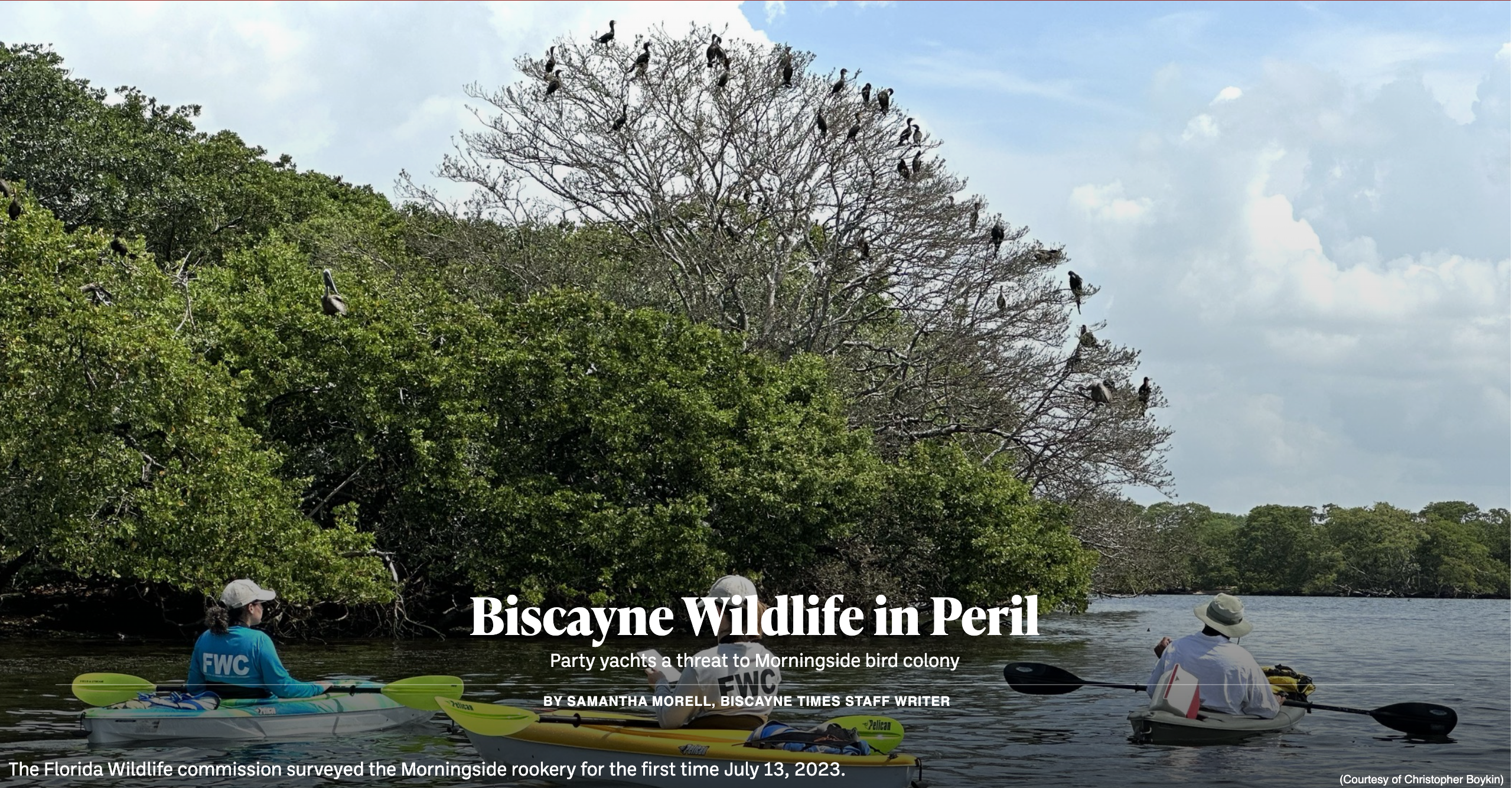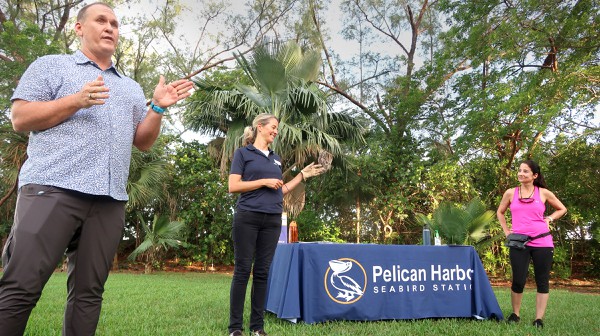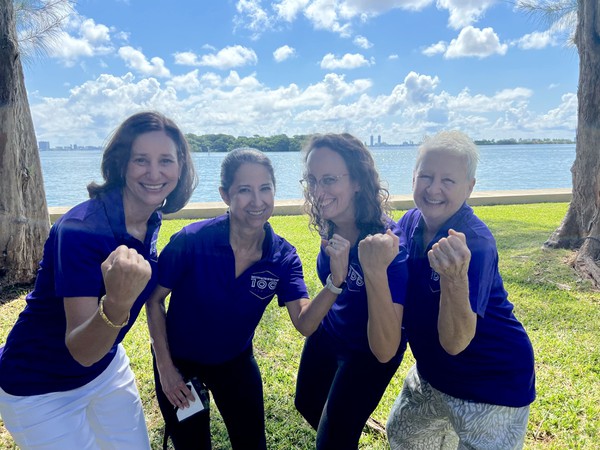Poor water quality in Biscayne Bay and its effects on underwater sea animals have been hot topics since the 2020 fish kill, which made headlines statewide and has occurred again every year since. Lesser known, however, are the impacts such conditions have on those found higher up, both in the food chain and in the ecosystem itself. Resting on tree canopies rather than tidal waves, our winged friends, too, rely heavily on the bay for their survival.
Located in Biscayne Bay off the coast of Belle Meade, Bird Key Island had served as a sanctuary for birds to nest and roost away from the dangers of predators – also known as a rookery – for at least 250 years. But between 2019 and 2020, almost as if to foreshadow the pending disaster, that centuries-old rookery collapsed.
Now, just three years later, Morningside residents have discovered a new rookery off their own coast, located on Morningside Picnic Islands just two miles south of Bird Key. Many believe the birds who abandoned the latter island have now adopted the Morningside rookery as their new safe haven, giving local conservationists another chance to protect them.
Although the exact cause of Bird Key’s collapse is unknown, what is known is that jet skis, boats and algae blooms pose a clear and present danger to the birds’ peace and resources. Add in a newly proposed floating social club to the mix, and things get especially tricky.
In its latest business venture, luxury hospitality collective Arkhaus is planning to place four multistory house yachts just 400 yards off the coast at Bird Key. The floating vessels will then be used as work, relaxation or social space by private members for an annual fee of $5,000 to $10,000.
Residents fear that the cost to the environment will be much greater.
Securing Protections
Residents of Morningside first heard of Arkhaus’ plan in June, right after a presentation on the rookery that they had only recently become aware of. Maji Ramos, a member of the Morningside 2023 Historic Homes Tour committee, helped organize the June 16, 2023, event, where members of the nonprofit organization Pelican Harbor Seabird Station were present to educate attendees on the importance of rookeries in South Florida.
All conversations pointed to Covo, whose district encompasses the city-owned Morningside island. At the next meeting, held July 13, the commissioner introduced a pocket item that would allow signs to be posted on the rookery, warning of its fragility and importance. The item passed unanimously.
“This is a starting point to protect our environment and to work with the state to make sure that we can give as much protection as we can as a city,” Covo later told the Biscayne Times.
Meanwhile that same day, south regional biologist Ricardo Zambrano visited Biscayne Bay on behalf of the FWC to survey the island and register it as an official rookery – per Moise’s request. He spotted five nesting species, one roosting species and one additional species whose activities couldn’t be distinguished one way or the other, and that’s just in the offseason.
“We were not aware that they were nesting there,” Zambrano said. “I guess it’s a relatively new colony … Now it’s confirmed that we have migratory bird species nesting there, which are protected” under the Migratory Bird Treaty Act.
The FWC has few options available to protect the rookery besides supporting educational initiatives like the one the city is already spearheading. The commission will, however, continue to monitor the island at least four times a year, expecting to find more species once the nesting season peaks in the spring.
Threats Ahead
Moise and the others involved relish the success they’ve found in securing protections for the Morningside rookery in collaboration with local and state agencies thus far, but there’s more at stake. Arkhaus plans to soft launch its Miami location in the first quarter of next year.
“We have a gem with Biscayne Bay,” said Moise. “Biscayne Bay is in a critical state. The water quality is really poor, so I don’t think it’s a good idea to add this element to the bay in any location.”
Arkhaus co-founders Sam Payrovi and Nathalie Paiva insist that the project is not at all what residents expect it to be.
“I know it’s being called a development or a party barge, but it’s neither one of those things,” said Payrovi. “There’s no development happening. We are not building anything. We are not affixing anything to the ground or building on the island. All it is, is four boats or four yachts that are next to each other, and that forms a social club.”
Paiva describes the approach as “eco-hospitality,” utilizing solar-powered vessels and electric propulsion systems as part of a larger environmental focus.
As for Bird Key, Payrovi said, “the birds have not been there for a very, very, very long time.”
But Boykin has the opposite idea. His wound is still fresh.
“The main concern is that, although the Bird Key rookery has collapsed, it’s only been a few years, and for something that has been there for three and a half centuries with such biodiversity to be replaced by a private social club – it just kind of hurts the heart,” he said.
Conversely, Paiva and Payrovi believe that their presence will actually benefit Bird Key. The duo, believing that trash buildup was the cause of the rookery’s collapse, plans to organize a large-scale cleanup of the island.
“We believe that if the birds are going to return to Bird Key, it’s going to be because of the environmental work that we do,” said Payrovi.
Although there are multiple suspects for the rookery’s collapse, Zambrano disagrees that trash is one of them. Unidentified predators and human disturbances are much more likely culprits than any plastic lying on the ground, far away from the tree canopies that birds like to occupy.
Because Bird Key is no longer an active rookery, Zambrano doesn’t submit to opposition against Arkhaus’ plans, but he also doesn’t believe that any efforts to restore the rookery are likely to persevere.
“There is hope, but not through us,” he said. “It would really be up to the birds to decide to come back. So far, no one’s really been successful in trying to attract these types of birds to a spot. We don’t know how they might choose one over another.”
“A lot of the ornithologists have said that it’s hard for the birds to come back once they’re gone,” Boykin said, “but they definitely won’t come back if there’s a private social club there with noise and music right there adjacent to the island.”
Murky Plans
Before Arkhaus can prove whether its plans will be environmentally harmful, it first has to prove that they’re even legal.
Laura Reynolds, vice president of Friends of Biscayne Bay, says Arkhaus isn’t likely to acquire the necessary permits to set up camp on Biscayne Bay, not if she has anything to do with it.
“You shouldn’t come anywhere near these islands with a vessel like that, and I’m fine to call it a vessel,” she said. “If you put a motor on it and you want to call it a vessel, that’s fine, but make no mistake. This is something that’s new that may not be dealt with in the law, and we need to deal with it. It is not something that’s sustainable because it will impact seagrasses and it will impact the birds.”
Lisa Spadafina, director of the county’s Division of Environmental Resources Management (DERM), can’t say one way or another whether the Arkhaus project will be allowed because she has yet to receive a permit application from the company. She did explain, however, that the county’s master plan ensures that Biscayne Bay is only used for water-dependent structures, like docks, fishing or diving, while another section of the code prohibits floating structures altogether.
“To protect the bay and its resources, the code is aimed at limiting things that don’t need to be impactful to the bay,” Spadafina said. “Anything that doesn’t need to be on the water shouldn’t be on the water. If somebody wanted to build a tennis club or a social club or have a place for people to convene and have yoga classes, all of those things wouldn’t really be water-dependent.”
Conceptually speaking, then, the plan isn’t allowed, at least not according to county code. The company is also regulated by city permitting processes and the U.S. Coast Guard. Payrovi said the company’s legal team is responsible for working through all of the necessary clearances, but that they’re not trying to skirt any rules.
“It’s in their hands at this point,” said Payrovi. “What I can tell you is that everything that we need, we will get.”
Arkhaus can indeed apply for a variance to the county code. That would require the project being reviewed by city staff, for which environmental impact is a factor, and then considered at a public hearing and approved by the Board of County Commissioners.
Broader Issues
Watching birds fly in and out of the Morningside Picnic Islands during sunrise and sunset, Moise once had no idea that some of those birds relied on the sanctuary to nest and care for their offspring. She didn’t know that for some of those birds, it would be the first home they ever knew.
She also didn’t know when she saw manatees and dolphins return to Biscayne Bay during the peak of the COVID pandemic that those animals were returning to a state-protected landmark known as the Biscayne Bay Aquatic Preserve, now approaching its 50th year of existence.
“People don’t realize the entire bay is protected,” said Reynolds, “not just the national park.”
While Arkhaus touts ecological innovation, residents are calling for a complete restoration of the bay to its most natural state, and surely that doesn’t include an 8,500 square-foot platform floating in the middle of it – even if it comes with environmental efforts like a fleet of underwater drones to test water toxicity and salinity.
“It’s a smokescreen in my opinion,” said Morningside resident Jeff King. “We don’t need drones to tell us the bay’s on fire.”
Perhaps, then, our winged friends can serve as the primary surveyors of the bay’s health. To test ecological stability, look to the birds. Look to the Morningside rookery.
“These birds have adopted this island to roost there at night, to nest there and produce their offspring there, so it’s a marvel, and we need to protect it,” Moise said. “We need to do more to protect it.”

 Facebook
Facebook
 X
X
 Pinterest
Pinterest
 Copy Link
Copy Link


